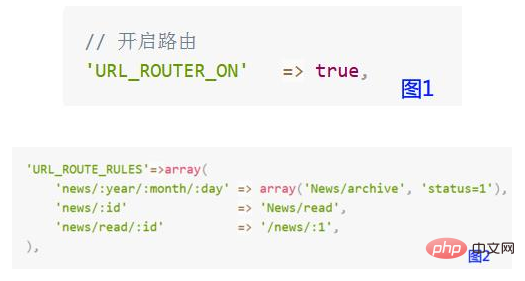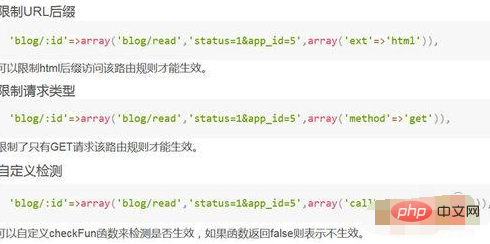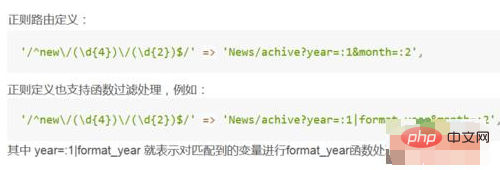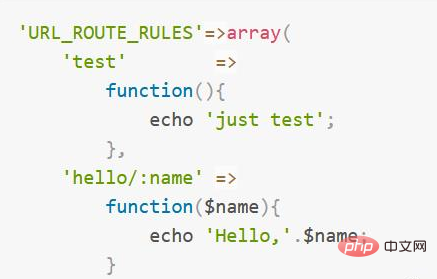The definition and use of thinkphp framework routing

The definition and use of thinkphp framework routing
The specific and powerful route definition function of ThinkPHP framework can basically meet the needs of All requirements for website routing, including rule routing, regular routing, static routing, and closure support for routing.
The following introduces the definition and use of ThinkPHP framework routing.
Routing definition
Enable routing. Three conditions need to be met for ThinkPHP routing configuration to take effect:
(1) Enable the routing function in the configuration file, as shown in Figure 1;
(2) The URL supports PATH_INFO mode or is compatible with URL mode;
(3) Use the URL_ROUTE_RULES parameter in the configuration file to configure, as shown in Figure 2 below.

Route definition format. There are two defined formats:
(1) 'Routing expression'=>'Routing address and incoming parameters;
(2)array('Routing expression ','routing address','incoming parameters').

Routing parameter configuration. The function of these parameters is to limit the validity conditions of the defined routing rules. They mainly have three functions, namely restricting URL suffixes, restricting request types, and customizing detection.

Routing uses
rule routing. Rule routing expressions include static addresses and dynamic addresses, or a combination of both addresses, as shown below.
Note: Parameters starting with ":" in each parameter represent dynamic parameters. For example: id means that the matched parameter can be obtained using $_GET['id'], and :year, :month and :day correspond to $_GET['year'], $_GET['month'] and $ respectively. _GET['day'].

Regular routing must start with "/". The expression not only supports regular definition, but also supports function filtering.

#Static routing. The definition of the route in the expression does not contain dynamic parameters. It has high execution efficiency but limited effect. The format of a static route is: [Controller/Operation?] Parameter 1 = Value 1 & Parameter 2 = Value 2.
Note: In order not to affect the traversal efficiency of dynamic routing, static routing is defined using URL_MAP_RULES to distinguish it from dynamic routing.

Use closures to define routes. This method does not require the execution of the controller's operation method, as shown below.

This article comes from the ThinkPHP framework technical article column: http://www.php.cn/phpkj/thinkphp/
The above is the detailed content of The definition and use of thinkphp framework routing. For more information, please follow other related articles on the PHP Chinese website!

Hot AI Tools

Undresser.AI Undress
AI-powered app for creating realistic nude photos

AI Clothes Remover
Online AI tool for removing clothes from photos.

Undress AI Tool
Undress images for free

Clothoff.io
AI clothes remover

Video Face Swap
Swap faces in any video effortlessly with our completely free AI face swap tool!

Hot Article

Hot Tools

Notepad++7.3.1
Easy-to-use and free code editor

SublimeText3 Chinese version
Chinese version, very easy to use

Zend Studio 13.0.1
Powerful PHP integrated development environment

Dreamweaver CS6
Visual web development tools

SublimeText3 Mac version
God-level code editing software (SublimeText3)

Hot Topics
 1386
1386
 52
52


